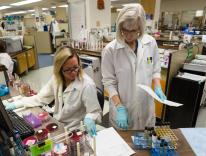Amid the many remembrances of Daniel Berrigan, I want to highlight a biography of him and his brother Philip that was reviewed in Commonweal by David O’Brien in 1997. The review itself paints a fuller picture of the “life and times” in which the Berrigan brothers were shaped, and describes the significance of how they went on to shape the lives and times of many others—particularly American Catholics.
We get a glimpse of the Berrigans’ family life in upstate New York. They grew up in the Depression with a father who “brooded over his failures,” whose “anger overwhelmed the love of their mother, and who made leaving home easier.” Yet “Dado” left copies of the Catholic Worker around the house and helped set up a Catholic Interracial Council in Syracuse, exposing his sons to Catholic social teaching. The brothers began creating discomfort “amid the conformist self-congratulations of fifties’ Catholicism”:
It began as fairly modest efforts to awaken the lay apostolate and challenge the church’s own racism, then to respond to Pope John XXIII and the council, then to confront their country’s bloody war in Vietnam.
By then, O’Brien summarizes, a Catholic peace movement was capturing national attention, and it seemed the church at all levels began to face the problems that had long troubled them. “But it was never enough,” O’Brien writes, “less because [the Berrigans] were radicals, which they were, than that the nation’s capacity for violence, and self-deception, was far greater than anyone suspected.”
The biographers make clear the difficulties Daniel and Philip each faced as priests and laity: “Both loved being part of the church, and were hurt that some Catholics seemed more angry at them than at the warmakers.”
On nuclear weapons, “the most important issue of their time,” O’Brien concludes:
[T]hey faced the truth while far too many spent their talents seeking ways to justify the unjustifiable. The gifted moderates now seem convinced that they helped ‘our’ side ‘win’ the cold war, while the Berrigans still prefer, in Dan’s words, ‘to be as marginal as possible to madness.’ It is possible that only on those margins, with people like these that alternatives to madness can be imagined, a necessary step to the much desired renewal of our country and our church.
You can read the full review here.
